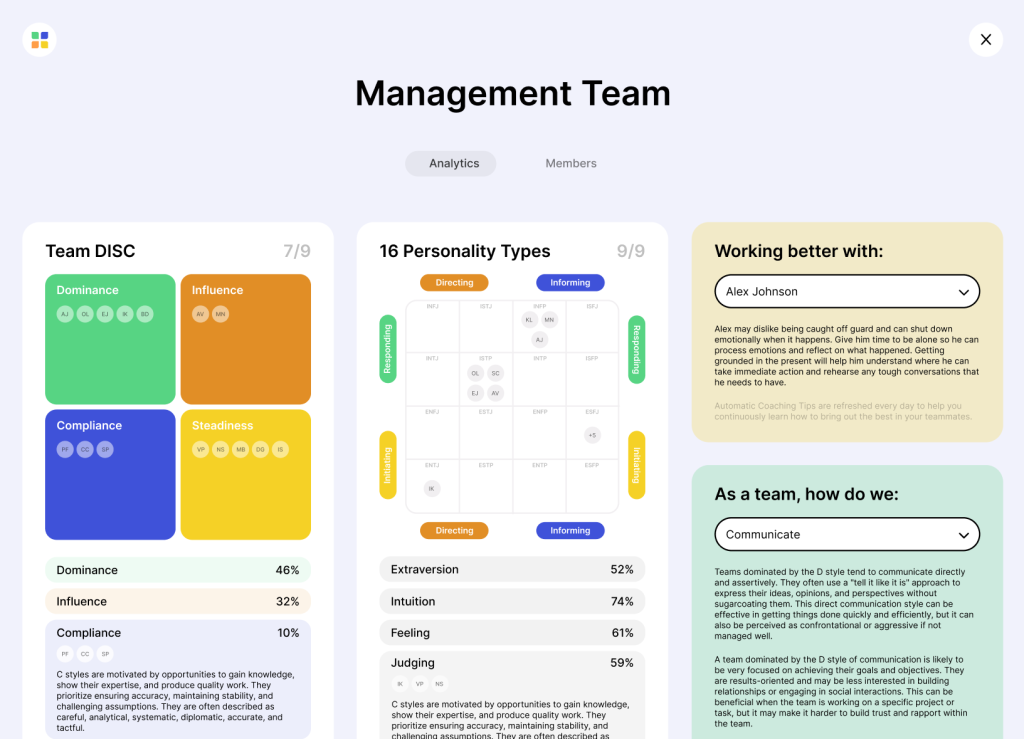The Myers-Briggs Type Indicator (MBTI) identifies the INFJ personality as the rarest among 16 personalities. The INFJ personality distinguishes two subtypes, INFJ- A (Assertive) and INFJ-T (Turbulent).
Each personality from the free MBTI assessment has four dominant traits, i.e., functions that determine a person’s preferences, interactions with the world, strengths, and weaknesses. The INFJ personality’s functions are introverted, intuitive, feeling, and judging, a combination that makes them the most empathetic, idealistic, and humanistic type in the world.
INFJs are nicknamed Advocates or Counselors, and they are guided by deeply-rooted moral values and principles.
Despite having idealistic views that go beyond the possible, INFJs are determined to achieve them regardless of obstacles and discouragements.
Cognitively, they pride themselves on their exceptional intuition, outstanding intellect, and in-depth thinking.
INFJs’ introverted function influences their need to experience and relive things inwardly, limiting their desire to interact with the people around them openly.
However, this perspective completely changes when they focus on other people’s feelings and issues.
They are incredibly attentive listeners and base their decisions on what they intuitively sense to be the right thing to do, rather than only focusing on facts.
Differences Between INFJ-A and INFJ-T
Friendships
The close social circle of INFJs, in general, is mainly closed and limited. They are caring individuals who like helping people and frequently find themselves listening to other people’s problems and looking for a solution.
But, that’s because they have an innate desire to be of use, not because they need company and entertainment.
Still, Assertive individuals are those INFJs who appear to be more outgoing and more socially active than their Turbulent counterparts.
Plus, Assertives are the ones who happen to ignore their friends’ suggestions or ideas, which might negatively influence their friendship.
On the flip side, Turbulent individuals maintain deeper connections with their friends and appear more considerate on that matter.
Relationships
INFJs in relationships experience deep emotional involvement that extends on a spiritual level. This means they consider their relationships very seriously, and when in love, they are affectionate and caring.
Both Assertive and Turbulent INFJs don’t easily open up, but as they gradually fall in love, they become more intimate and less private.
However, Turbulent INFJs look for greater ideals, true love seen in romantic films, and the ultimate connection between the two in one body, heart, and soul.
This also implies that Turbulent INFJs are likely to suffer much more than their Assertive counterparts in case of a breakup.
Workplace
Perhaps the most striking difference between INFJ-A and INFJ-T can be seen in their working environment. INFJ-Ts are perfectionists and motivated to work even when faced with stress and anxiety.
INFJ-As exhibit stimulating confidence that helps them to face daily challenges, and when compared with their Turbulent counterparts, they don’t get overly affected by tense situations.
But, Assertive individuals can appear overconfident, and that can give people a false impression of being careless and unconcerned.
Working in a Team
INFJs are excellent workers who find motivation in improving human conditions. When they are part of a team, they tend to maintain harmony and keep the team away from conflicts.
They are inspirational, attentive, and consider all team members.
Assertive INFJs are more goal-oriented and tend to avoid any potential problems and encourage others to move on. They keep a positive spirit in the team, they are enthusiastic, and always have the end goal in mind.
On the other hand, Turbulent INFJs appear as safeguards of the team’s dynamics and focus on discrepancies or problems that might arise if specific steps are not followed.
What Are The Key INFJ-A Characteristics?
Laid-Back
Confident
Assertive INFJs are much more confident and tend to keep a positive attitude during times of uncertainty and troubles. Their main attitude is “What’s done, can’t be undone” and generally go with the flow.
This doesn’t mean they are ignorant of the facts, just that they tend to keep themselves together when problems strike and won’t let stress influence their ongoing work, dedication, or accomplishments.
They don’t seem to pay attention to other people’s opinions as well.
Not Very Regretful
Past regrets teach them a lesson; however, Assertive INFJs don’t focus on things they can’t fix.
Since INFJs overall are future-oriented with the big picture ahead, it is more common among Assertives to keep on the same track until they achieve what they have focused on, often during the unperceived turn of events or sudden changes.
Sociable
What Are The Key INFJ-T Characteristics?
ENTJs are people of vision and big ideas, but they are not daydreamers. When starting out a project or working on an idea, they analyze and assess all the factors that lead to their accomplishment.
They are rarely carried away by emotions, less frequently biased, so they exactly know what they have to deal with on the way to achieving their goals.
Stress-induced Motivation
Not many individuals can boast of being at their best when faced with psychological pressure. Turbulent individuals have shown increased focus and attention to the slightest detail when working in stressful circumstances.
Since they are future-oriented, they focus on possibilities and obstacles and work towards achieving or removing them.
Perfectionists
Turbulent INFJs are high-achievers who tend to smooth out things to a level of perfection. They have an intrinsic desire to succeed, and that’s partially due to their self-doubt.
To compensate for this uncertainty, they look way beyond the surface and detect problems even in their conception stage.
Regretful
Emotional turmoil can often be part of INFJs’ lives, yet Turbulent individuals react to it more emotionally than their counterparts.
Regrets teach them meaningful lessons, and they are there to stay as a reminder of going through difficult situations for a long time.
Turbulent INFJs often find themselves reliving past situations and feel more vulnerable to making mistakes.
Sensitive to other people’s opinions
INFJs generally care about others and consider their opinions and feelings, but Turbulent INFJs take things on a more personal level, particularly when criticism is involved.
Even their decision-making process can be tarred by someone’s opinion, which can negatively affect their future projects
Is an INFJ-T rare?
Yes, INFJ-T is quite a rare personality type. In general, all INFJs are rare since they only make up around 2% of the population (making them the rarest of all the MBTI personality types).
Within INFJs, INFJ-Ts may be a bit more common, since turbulence is a more common trait than assertiveness. However, they still make up less than 2% of the population.
Is INFJ-A and INFJ-T the same?
INFJ-A and INFJ-T are both INFJs. This means they are both introverted, intuitive, feeling, and judging types. However, the A subset of INFJs is assertive, while the T subset is turbulent. Thus, there are a few differences between the two INFJs.
Those that are turbulent tend to worry more, experience more negative emotions and stress, be perfectionistic, and always want to improve. The assertive types are more relaxed, experience less stress, are less perfectionistic, but are also less success-driven.
Is INFJ-T rarer than INFJ-A?
In general, it is rarer to find an INFJ-A than an INFJ-T. So, no, this personality type is likely more common than the INFJ-A, although the data is not widely available.
However, INFJs tend to be worriers and stress more than the average person. This is more in line with the sensitive and somewhat perfectionistic tendencies that an INFJ has.
Are INFJ and INFJ-T compatible?
Yes, two INFJs can have a very fruitful relationship with one another. There will likely be very few trust issues between the two partners, so cheating is not a major concern.
They will also share their empathy, intuition, and passions deeply. When the two start a relationship, it will probably last for the long-term, since INFJs do not typically enjoy casual dating.
Who is INFJ-T compatible with?
The best partner for an INFJ would likely be the ENFP or ENTP. These two extroverted personalities can help the INFJ develop a social circle and will allow the INFJ to grow their social skills.
Plus, ENFPs and ENTPs both often support those around them. The conversations between an INFJ and these two personality types will likely be engaging and genuine.

